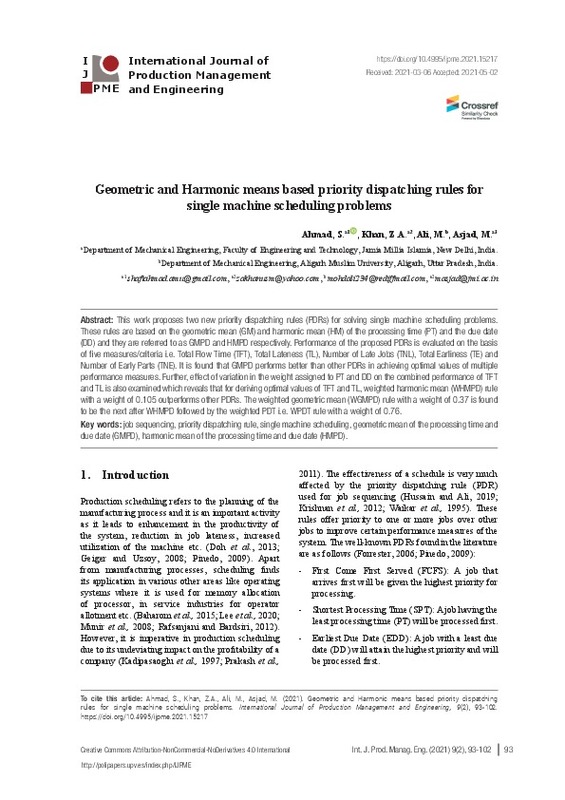Baharom, M. Z., Nazdah, W., &Hussin, W. (2015). Scheduling Analysis for Job Sequencing in Veneer Lamination Line. Journal of Industrial and Intelligent Information, 3(3). https://doi.org/10.12720/jiii.3.3.181-185
Chan, F. T. S., Chan, H. K., Lau, H. C. W., & Ip, R. W. L. (2003). Analysis of dynamic dispatching rules for a flexible manufacturing system. Journal of Materials Processing Technology, 138(1), 325-331. https://doi.org/10.1016/S0924-0136(03)00093-1
Cheng, T. C. E., &Kahlbacher, H. G. (1993). Single-machine scheduling to minimize earliness and number of tardy jobs. Journal of Optimization Theory and Applications, 77(3), 563-573. https://doi.org/10.1007/BF00940450
[+]
Baharom, M. Z., Nazdah, W., &Hussin, W. (2015). Scheduling Analysis for Job Sequencing in Veneer Lamination Line. Journal of Industrial and Intelligent Information, 3(3). https://doi.org/10.12720/jiii.3.3.181-185
Chan, F. T. S., Chan, H. K., Lau, H. C. W., & Ip, R. W. L. (2003). Analysis of dynamic dispatching rules for a flexible manufacturing system. Journal of Materials Processing Technology, 138(1), 325-331. https://doi.org/10.1016/S0924-0136(03)00093-1
Cheng, T. C. E., &Kahlbacher, H. G. (1993). Single-machine scheduling to minimize earliness and number of tardy jobs. Journal of Optimization Theory and Applications, 77(3), 563-573. https://doi.org/10.1007/BF00940450
da Silva, N. C. O., Scarpin, C. T., Pécora, J. E., & Ruiz, A. (2019). Online single machine scheduling with setup times depending on the jobs sequence. Computers & Industrial Engineering, 129, 251-258. https://doi.org/10.1016/j.cie.2019.01.038
Doh, H.H., Yu, J.M., Kim, J.S., Lee, D.H., & Nam, S.H. (2013). A priority scheduling approach for flexible job shops with multiple process plans. International Journal of Production Research, 51(12), 3748-3764. https://doi.org/10.1080/00207543.2013.765074
Dominic, Panneer D. D., Kaliyamoorthy, S., & Kumar, M. S. (2004). Efficient dispatching rules for dynamic job shop scheduling. The International Journal of Advanced Manufacturing Technology, 24(1), 70-75.
Ðurasević, M., &Jakobović, D. (2018). A survey of dispatching rules for the dynamic unrelated machines environment. Expert Systems with Applications, 113, 555-569. https://doi.org/10.1016/j.eswa.2018.06.053
Forrester, P. (2006). Operations Management: An Integrated Approach. International Journal of Operations & Production Management.
Geiger, C. D., &Uzsoy, R. (2008). Learning effective dispatching rules for batch processor scheduling. International Journal of Production Research, 46(6), 1431-1454. https://doi.org/10.1080/00207540600993360
Hamidi, M. (2016). Two new sequencing rules for the non-preemptive single machine scheduling problem. The Journal of Business Inquiry, 15(2), 116-127.
Holthaus, O., & Rajendran, C. (1997). New dispatching rules for scheduling in a job shop-An experimental study. The International Journal of Advanced Manufacturing Technology, 13(2), 148-153. https://doi.org/10.1007/BF01225761
Hussain, M. S., & Ali, M. (2019). A Multi-agent Based Dynamic Scheduling of Flexible Manufacturing Systems. Global Journal of Flexible Systems Management, 20(3), 267-290. https://doi.org/10.1007/s40171-019-00214-9
Jayamohan, M. S., & Rajendran, C. (2000). New dispatching rules for shop scheduling: A step forward. International Journal of Production Research, 38(3), 563-586. https://doi.org/10.1080/002075400189301
Kadipasaoglu, S. N., Xiang, W., &Khumawala, B. M. (1997). A comparison of sequencing rules in static and dynamic hybrid flow systems. International Journal of Production Research, 35(5), 1359-1384. https://doi.org/10.1080/002075497195371
Kanet, J. J., & Li, X. (2004). A Weighted Modified Due Date Rule for Sequencing to Minimize Weighted Tardiness. Journal of Scheduling, 7(4), 261-276. https://doi.org/10.1023/B:JOSH.0000031421.64487.95
Lee, D.K., Shin, J.H., & Lee, D.H. (2020). Operations scheduling for an advanced flexible manufacturing system with multi-fixturing pallets. Computers & Industrial Engineering, 144, 106496. https://doi.org/10.1016/j.cie.2020.106496
Lu, C.C., Lin, S.W., & Ying, K.C. (2012). Robust scheduling on a single machine to minimize total flow time. Computers & Operations Research, 39(7), 1682-1691. https://doi.org/10.1016/j.cor.2011.10.003
Krishnan, M., Chinnusamy, T. R., & Karthikeyan, T. (2012). Performance Study of Flexible Manufacturing System Scheduling Using Dispatching Rules in Dynamic Environment. Procedia Engineering, 38, 2793-2798. https://doi.org/10.1016/j.proeng.2012.06.327
Munir, E. U., Li, J., Shi, S., Zou, Z., & Yang, D. (2008). MaxStd: A task scheduling heuristic for heterogeneous computing environment. Information Technology Journal, 7(4), 679-683. https://doi.org/10.3923/itj.2008.679.683
Oyetunji, E. O. (2009). Some common performance measures in scheduling problems. Research Journal of Applied Sciences, Engineering and Technology, 1(2), 6-9.
Pinedo, M. L. (2009). Planning and Scheduling in Manufacturing and Services (2nd ed.). Springer-Verlag. https://doi.org/10.1007/978-1-4419-0910-7
Prakash, A., Chan, F. T. S., & Deshmukh, S. G. (2011). FMS scheduling with knowledge based genetic algorithm approach. Expert Systems with Applications, 38(4), 3161-3171. https://doi.org/10.1016/j.eswa.2010.09.002
Rafsanjani, M. K., &Bardsiri, A. K. (2012). A New Heuristic Approach for Scheduling Independent Tasks on Heterogeneous Computing Systems. International Journal of Machine Learning and Computing, 371-376. https://doi.org/10.7763/IJMLC.2012.V2.147
Tyagi, N., Tripathi, R. P., &Chandramouli, A. B. (2016). Single Machine Scheduling Model with Total Tardiness Problem. Indian Journal of Science and Technology, 9(37). https://doi.org/10.17485/ijst/2016/v9i37/97527
Vinod, V., & Sridharan, R. (2008). Dynamic job-shop scheduling with sequence-dependent setup times: Simulation modeling and analysis. The International Journal of Advanced Manufacturing Technology, 36(3), 355-372. https://doi.org/10.1007/s00170-006-0836-4
Waikar, A. M., Sarker, B. R., & Lal, A. M. (1995). A comparative study of some priority dispatching rules under different shop loads. Production Planning & Control, 6(4), 301-310. https://doi.org/10.1080/09537289508930284
[-]









